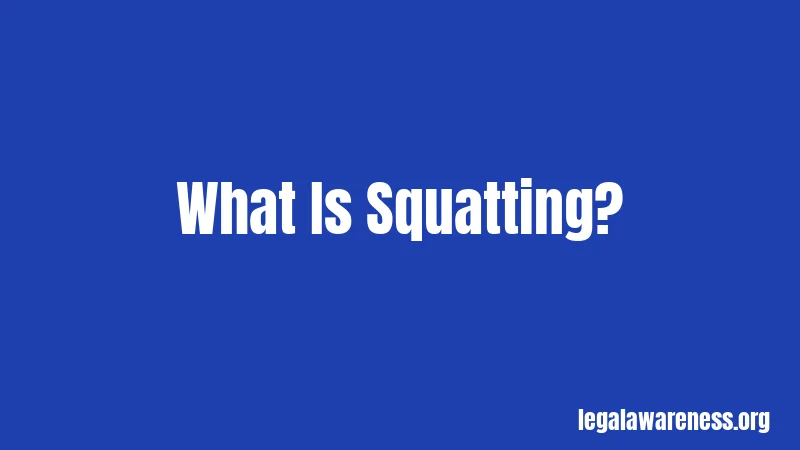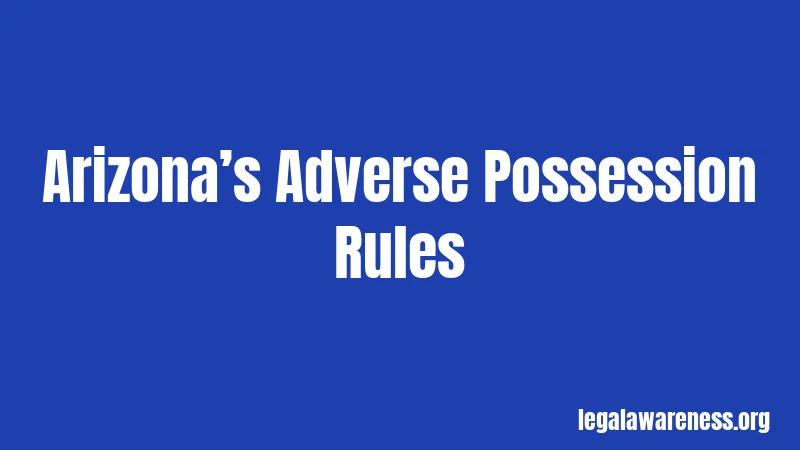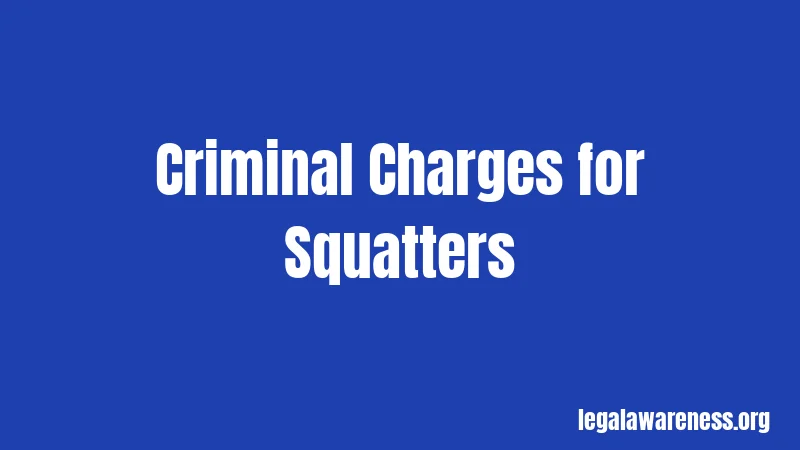Arizona Squatter Laws (2026): What Property Owners Must Know
Most property owners have no idea how serious squatter laws are in Arizona. Seriously. If you own property here, you need to understand your rights and the legal process to remove squatters. Let’s break down exactly what you need to know.
Arizona has specific laws about squatting, trespassing, and adverse possession. These rules protect both property owners and people who claim rights to land. Understanding them can save you money, time, and major headaches.
What Is Squatting?

Squatting is when someone lives on or uses property they don’t own without permission. Pretty straightforward, right? They’re basically taking up residence without a lease, agreement, or legal claim.
Now, here’s where it gets interesting. Arizona recognizes something called adverse possession. This is different from regular squatting. Adverse possession means a person can actually gain legal ownership of property by using it openly for a long time. Sound complicated? It’s actually not once you break it down.
Basic Arizona Squatter Laws
What Counts as Squatting
In Arizona, squatting happens when someone occupies property without the owner’s permission. This could be living in an abandoned house, camping on land, or using a building. The key thing is they have no legal right to be there.
You’re not alone, this confuses a lot of people. Some people think squatting is only about living in a house. But in Arizona, it covers any unauthorized use of property. That includes temporary stays, storing items, or even just camping on your land.
Trespassing vs. Squatting
Trespassing and squatting are related but different. Trespassing means entering property without permission. Squatting means staying there and establishing residence. Think of it like this: trespassing is walking into someone’s yard. Squatting is moving into their house.
Arizona law treats them separately. Trespassing is usually the first step toward squatting. If someone crosses onto your property and you don’t stop them, they might claim squatter’s rights later.
How Squatters Can Claim Rights
Here’s where things get serious. In Arizona, a squatter can potentially gain legal ownership through adverse possession. This doesn’t happen overnight, though. They must occupy the property for a specific time period.
Arizona requires 10 years of continuous, open occupation for adverse possession to work. That’s a long time, but it’s important to know. The squatter must use the property as if they own it. They must pay property taxes too. If they do all this, they could actually become the legal owner.
Wait, it gets better. The squatter doesn’t need to hide what they’re doing. They can occupy the property openly. In fact, they must occupy it openly. Arizona law is pretty clear about this requirement.
Arizona’s Adverse Possession Rules

The 10-Year Rule
Arizona’s adverse possession law is found in the state statutes. A squatter needs to possess your property openly and continuously for 10 years. Open means they don’t hide that they’re there. Continuous means they stay on the property without major interruptions.
Honestly, this is the part most people miss. You can’t just leave property abandoned and expect to keep it. If someone openly uses it for a decade, they could become the owner. This applies to land and buildings both.
What “Continuous” Actually Means
Continuous doesn’t mean they never leave. It means they maintain a regular presence on the property. They could leave for trips and still maintain continuity. What matters is they keep coming back and staying.
Arizona courts have ruled on this many times. A squatter can interrupt their possession for short periods. But if you reclaim the property during those gaps, their clock resets. That’s why documenting everything is crucial.
Tax Payments and Adverse Possession
Here’s something surprising. In Arizona, a squatter doesn’t actually have to pay property taxes to claim adverse possession. This is different from some other states. Arizona’s law doesn’t require tax payment as a condition.
However, paying taxes strengthens their claim significantly. If they pay taxes for the full 10 years, they have an even stronger case. They could argue they’ve improved and maintained the property too.
Removing Squatters from Your Property
The Legal Process
If squatters are on your property right now, you can’t just remove them yourself. Well, you technically can, but legally you need to follow Arizona’s eviction process. Removing someone by force or threats could get you in trouble instead.
The proper way is through the courts. Arizona requires a formal eviction process. This starts with an unlawful detainer action. Basically, you’re asking the court to remove them legally.
First, you give notice to the squatter. Arizona law typically requires 5 to 30 days’ notice depending on the situation. You’re telling them to leave. If they don’t, you file with the court.
Filing an Unlawful Detainer Action
This is the legal term for eviction. You file a lawsuit in Arizona’s justice court or superior court. The paperwork states why you’re seeking to remove them. You must prove you own the property and they have no legal right to be there.
The court will schedule a hearing. Both you and the squatter get to present your case. If the squatter has lived there for 10 years, they might claim adverse possession. That’s when things get complicated.
How Long Does It Take?
This varies quite a bit. If the squatter doesn’t fight back, it could be quick. Maybe 30 to 60 days start to finish. If they claim adverse possession or argue their case, it takes much longer. You could be looking at months or even a year in court.
Stay with me here. Getting professional help speeds this up significantly. A lawyer who handles evictions in Arizona knows the process inside and out. They can file correctly and argue your case effectively.
Getting a Judgment and Removal
Once the court rules in your favor, you receive a judgment. This says the squatter must leave. If they still refuse, you can bring in law enforcement. A sheriff or constable will physically remove them and their belongings.
You typically have to pay the court costs and sheriff’s fees. These can add up. A simple eviction might cost $500 to $1,500. A contested case with a squatter claiming adverse possession could cost thousands.
Criminal Charges for Squatters

Trespassing Charges
Arizona law makes trespassing a crime. If someone enters or stays on property without permission, they can be charged. This is found in Arizona Revised Statutes section 13-3102.
Trespassing can be charged as a misdemeanor. Penalties include fines and jail time. For a first offense, you might face up to 30 days in jail and a $250 fine. Sounds serious? It is, but not compared to other charges.
Burglary and Breaking and Entering
If squatters force entry or break into a building, it gets worse. This could be charged as burglary instead of trespassing. Burglary carries much harsher penalties. You could face felony charges and significant jail time.
Arizona separates burglary by degree. Third-degree burglary is the least serious. Even so, it could mean 3 to 12 years in prison. Many squatter cases don’t reach burglary level, but breaking in definitely does.
Calling Police on Squatters
As a property owner, you can call the police about squatters. Report it as trespassing. Police can investigate and potentially arrest them. However, if they claim adverse possession, the police might say it’s a civil matter, not criminal. This is frustrating but common.
Okay, pause. Read this carefully. Document everything before calling police. Take photos and videos showing the squatters on your property. Get dates and times. Write down who’s living there if possible. This documentation helps police understand the situation better.
Arizona’s Adverse Possession Defenses
Proof of Ownership
The strongest defense is proof of ownership. You must show clear title to the property. Property deeds and tax records help here. If you can prove you own it, the squatter’s claim fails.
Arizona recognizes color of title. This means the squatter has a document suggesting they own the property, even if invalid. With color of title, they only need 3 years of adverse possession instead of 10. This is why clear ownership documentation matters.
Active Management of Property
The more active you are managing your property, the harder it is for squatters to claim adverse possession. Visit regularly. Post no trespassing signs. Maintain the property visibly. Lock gates and doors. All this shows you haven’t abandoned the property.
A friend asked me about this last week. They had a vacant lot with no fence or signs. Squatters moved in. The property owner hadn’t visited in years. This made the squatter’s claim stronger. Don’t let this be you.
Written Denial of Rights
Document your refusal to allow squatters to stay. Write them letters saying they have no permission. Keep copies for your records. This establishes that occupation wasn’t permitted. It helps prevent adverse possession claims.
Regular Notice to Squatters
Send written notices periodically. This interrupts their “continuous” possession claim in some interpretations. Each notice resets their timeline. It shows you haven’t abandoned the property.
Special Circumstances in Arizona
Adverse Possession with Color of Title
Arizona law makes adverse possession easier if someone has “color of title.” This means they possess a document showing a claim to the property. Maybe a forged deed or an invalid document. With color of title, the 10-year requirement drops to 3 years.
Personally, I think this law makes sense. It protects people who bought property in good faith from someone without authority. But it also gives squatters with fake documents a shorter path to ownership. Know the difference between true ownership and claimed ownership.
Government Property
You can’t claim adverse possession on government property. Arizona, federal, or local government land is protected. Squatters on public lands face criminal charges instead. They can’t become the legal owner no matter how long they stay.
Native American Trust Land
Arizona has significant Native American trust land. Different rules apply here. You can’t claim adverse possession on trust lands. Federal law protects these properties differently than regular Arizona property.
Property with Encroachments
Sometimes neighbors’ property crosses onto your land slightly. This is different from full squatting. Encroachment is smaller scale. It might be a fence line, shed, or driveway. Arizona handles encroachments similarly but considers the size and nature of the use.
How to Prevent Squatting
Secure Your Property
Lock all doors and windows. Board up vacant buildings. Install security cameras if possible. Physical barriers prevent easy entry. They also show you’re actively managing the property.
The more secure your property looks, the less attractive it is to squatters. This sounds simple, but it works. Visible security tells squatters to move along to easier targets.
Post Clear Signage
No trespassing signs matter legally. They establish that you haven’t abandoned the property. Post them clearly and keep them maintained. Faded signs suggest the property is forgotten.
Keep no trespassing signs current. Replace them if they get damaged. This ongoing maintenance shows active ownership. It’s cheap insurance against adverse possession claims.
Maintain the Property Regularly
Visit vacant property regularly. Mow grass. Remove trash. Repair obvious damage. This demonstrates you haven’t abandoned it. Squatters are less likely to settle where the owner is obviously present.
Fence and Gate the Property
If possible, install fencing and gates. A locked gate is a powerful deterrent. It clearly states the property is controlled and monitored. Squatters often move on when they face barriers.
Document Everything
Keep records of maintenance, visits, and ownership. Save property tax bills. Photograph the property regularly. Document dates when you’re present. This creates a clear record of active ownership.
Wondering if you need this documentation? Yes, absolutely. If you ever need to fight an adverse possession claim, these records are your proof. They show you never abandoned the property.
Penalties for Property Owners Who Wrongfully Remove Squatters
Assault and Battery Charges
If you physically remove squatters yourself, you could face charges. Arizona law protects people, even squatters, from violence. Using force could result in assault charges. These carry serious penalties.
Conversion Charges
Conversion is taking someone’s property wrongfully. If you throw out squatters’ belongings, they could sue. You might be charged with conversion. This means paying damages for their lost items.
Failure to Follow Legal Process
The biggest mistake is not following proper eviction procedures. You must go through the courts. If you remove them illegally, you could face lawsuits. The squatter might even stay while you face legal troubles.
Frequently Asked Questions
Can I evict a squatter without going to court in Arizona? No, you need court approval. The unlawful detainer process is the legal way. Removing someone by force risks assault charges or conversion lawsuits against you.
How long does a squatter need to live on my property to own it? In Arizona, it’s typically 10 years of continuous, open occupation. If they have color of title (a document claiming ownership), it’s only 3 years. Either way, they can’t hide what they’re doing.
Do I need to pay property taxes if I have adverse possession in Arizona? Arizona doesn’t require tax payment for adverse possession to work. However, paying taxes for the full 10 years strengthens a squatter’s claim significantly. It shows they’ve invested in the property.
What’s the difference between trespassing and squatting in Arizona? Trespassing is entering without permission. Squatting is entering and staying long-term. Trespassing is immediate and criminal. Squatting becomes an issue over time and could lead to ownership claims.
Can I call police to remove squatters? You can call police about trespassing. However, if the squatter claims adverse possession and has been there for years, police might call it a civil matter. You’d need to go through eviction court instead.
Should I hire a lawyer for a squatting situation? Honestly, yes. Eviction law is complex. A lawyer ensures you follow proper procedures. They can handle court filings and defend against adverse possession claims. The cost is worth it to protect your property.
What happens if a squatter wins an adverse possession claim? They become the legal owner. You lose all rights to the property. This is why prevention matters so much. Don’t let property sit vacant without active management.
How do I interrupt a squatter’s adverse possession claim? Visit regularly and document your presence. Post no trespassing signs. Send written notices. Maintain the property visibly. Any action showing ownership can interrupt their continuity claim.
Final Thoughts
Arizona’s squatter and adverse possession laws are serious business. They protect property owners who stay engaged with their property. They also protect people who openly occupy land for extended periods. Understanding this balance helps you protect your interests.
Here’s the bottom line. Don’t leave property vacant without active management. Visit regularly. Post signs. Secure gates and doors. Document everything. If someone does squat on your property, handle it legally through the courts. Get a lawyer if possible.
Know your rights, know the law, and when in doubt, ask a professional. Stay informed, stay proactive, and protect what’s yours.
References
Arizona Revised Statutes – Property Rights https://housing.az.gov/documents-links/arizona-revised-statutes
Arizona Revised Statutes Section 12-521 (Adverse Possession) https://legislature.az.gov/statutes/ars/12/521
Arizona Revised Statutes Section 13-3102 (Trespassing) https://legislature.az.gov/statutes/ars/13/3102
Arizona Justice Court Training Center – Eviction Procedures https://www.azjustice.org/
Arizona State Library – Legal Resources https://library.az.gov/research/legal-resources
Arizona Residential Tenancies Act https://legislature.az.gov/statutes/ars/34/201
Arizona Courts – Self-Help Center https://www.azcourthelp.org/
Arizona Bar Association – Lawyer Referral Service https://www.azbar.org/membership/find-legal-help/
